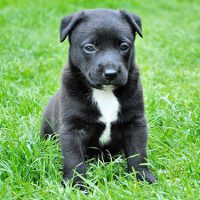How to Train a Puppy
Having a new puppy can be a lot of fun, but is also a big responsibility. Puppies don’t know that aggressive behavior is wrong or that they should go to the bathroom outside; they have to be trained properly. If you teach your puppy proper behavior from the beginning, he or she will grow into a well-trained adult dog and can become a loving member of your family for years to come.
Puppies are eager to please the humans in their lives, which makes them very easy to train. You’ll want to use positive reinforcement techniques to encourage the behaviors you want to see more of. For example, when your puppy sits on command or uses the bathroom outside rather than in the house, pet it, speak softly to it or give it a treat.
It’s important to remember that puppies don’t speak English; they respond to the tone of your voice rather than what you say. So if your puppy does something you don’t want it to do, make sure you raise your voice while saying, “No!” Do not pet or play with a puppy immediately after it has done something wrong, as it will view these as rewards and continue engaging in the behavior. If possible, you should ignore negative behaviors; puppies respond to getting attention. If a behavior needs to be stopped right away, limit your interaction to a stern “No!” and then walking away from the puppy.

It’s extremely important to be consistent. If you want your puppy to engage in a particular behavior, reward that behavior every time until the puppy has learned the behavior. If you want your puppy to avoid particular behaviors, respond in the same manner every time you see the behavior.
Puppies become confused if you sometimes reward and sometimes punish the same behavior or if you sometimes ignore and sometimes respond to the behavior. Thus, you should always respond the same way to the same behavior so that your puppy know what you expect.
It’s especially important to train your puppy not to be aggressive. Some dog owners forget that their puppy will someday grow into a large dog; behaviors that seemed “cute” when the dog was little can be dangerous when the dog gets bigger!
If you see aggressive behavior, such as snarling and growling, immediately tell your puppy “No!” in a stern voice. Never pet your puppy following aggressive behavior; only pet it and reward it with treats for calm behavior. You should also avoid aggressive play with your dog, as that could rev it up into a frenzy of snarling and biting.
Make sure ou understand the reason for the aggressive behavior. If your puppy is teething, it might bite because its teeth hurt; get appropriate toys for it to teeth on instead. Puppies also tend to get aggressive if they are left alone for too long or don’t have any opportunity to socialize. Make sure you correct these problems so that the dog doesn’t continue to act out.
Training your puppy may seem like a lot of work, but it is worth it. If you teach your puppy from the beginning how to behave, it will become a loyal, loving and loved member of your family.





